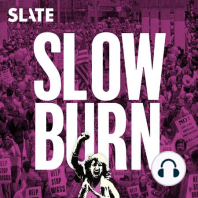7 min listen
Decoder Ring: What's Really Going On Inside a Mosh Pit?
FromSlow Burn
ratings:
Length:
35 minutes
Released:
Jul 19, 2023
Format:
Podcast episode
Description
The mosh pit has a reputation as a violent place where (mostly) white guys vent their aggression. There’s some truth to that, but it’s also a place bound by camaraderie and—believe it or not—etiquette. In this episode, we explore the unwritten rules of this 50-year-old, live-music phenomenon with punks, concertgoers and a heavy metal physicist.
Decoder Ring is produced by Willa Paskin with Katie Shepherd. This episode was written by Katie Shepherd. This episode was edited by Willa Paskin and Andrea Bruce, with help from Joel Meyer. Derek John is Slate’s executive producer of narrative podcasts. Merritt Jacob is our senior technical director.
Thank you to Vivien Goldman, Paolo Ragusa, and Philip Moriarty whose insights and research on moshing were crucial to this episode. You can create your own mosh pit using this simulator developed by Jesse Silverberg and his colleagues.
If you haven’t yet, please subscribe and rate our feed on Spotify, Apple Podcasts or wherever you get your podcasts. And even better, tell your friends.
If you’re a fan of the show and want to support us, consider signing up for Slate Plus. As a member, you’ll get to listen to Decoder Ring without any ads—and your support is crucial to our work. Go to slate.com/decoderplus to join Slate Plus today.
Learn more about your ad choices. Visit megaphone.fm/adchoices
Decoder Ring is produced by Willa Paskin with Katie Shepherd. This episode was written by Katie Shepherd. This episode was edited by Willa Paskin and Andrea Bruce, with help from Joel Meyer. Derek John is Slate’s executive producer of narrative podcasts. Merritt Jacob is our senior technical director.
Thank you to Vivien Goldman, Paolo Ragusa, and Philip Moriarty whose insights and research on moshing were crucial to this episode. You can create your own mosh pit using this simulator developed by Jesse Silverberg and his colleagues.
If you haven’t yet, please subscribe and rate our feed on Spotify, Apple Podcasts or wherever you get your podcasts. And even better, tell your friends.
If you’re a fan of the show and want to support us, consider signing up for Slate Plus. As a member, you’ll get to listen to Decoder Ring without any ads—and your support is crucial to our work. Go to slate.com/decoderplus to join Slate Plus today.
Learn more about your ad choices. Visit megaphone.fm/adchoices
Released:
Jul 19, 2023
Format:
Podcast episode
Titles in the series (100)
S2 Ep. 8: Move On: In 1998, Congress weighed whether Juanita Broaddrick’s rape accusation against Bill Clinton was grounds for impeachment. by Slow Burn
